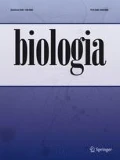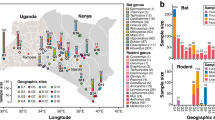Abstract
The current epidemics of vector-borne diseases in tropical countries, especially in India, have extended the need for a comprehensive understanding of the distribution of epidemiologically important vector mosquitoes. The advanced developments in genomic research including phylogenetic studies will empower the molecular studies that are vital to determine the genetic divergence and evolutionary history of mosquito vectors. The use of the cytochrome oxidase c subunit I (COI) gene-based approaches to outline the interrelationship of vector mosquitoes from different genera could also elucidate the obscurity that has risen from improper taxonomical classification. The mosquitoes were collected from Nelliyampathy, Kerala, India and identified using systematic keys and catalogues. The genomic DNA of the mosquitoes was extracted using NucleoSpin® Tissue Kit and PCR amplification of the mitochondrial COI gene was accomplished by using the following primers: Forward 5′- GGTCAACAAATCATAAAGATATTGG-3′ and reverse 5′- TAAACTTCAGGGTGACCAAAAAATCA-3′. The genetic divergence was assessed by means of the NJ-K2P method. The neighbor-joining tree was constructed using the MEGA7 software. The diversity of mosquitoes was estimated using the Shannon index through SPSS and Venn diagram plotter. The COI gene-based mitochondrial DNA analysis revealed distinct clustering of individual mosquito species within every genus together with strong bootstrap support. In total, our investigation productively identified and confirmed the interrelationship between the COI gene sequences of ten epidemiologically important mosquito species. This study also discusses the substantial evidence of mosquito species complex formation. Our findings offer a base for future research which is essential for the better understanding of mosquito phylogeny and shed light upon, a novel vector control strategy.









Similar content being viewed by others
References
Aivazi A-A, Vijayan V (2010) Efficacy of Ruta graveolens extract and its synergistic effect with cypermethrin against Anopheles stephensi Liston larvae. Toxicol Environ Chem 92:893–901. https://doi.org/10.1080/02772240903092306
Aliota MT, Peinado SA, Osorio JE, Bartholomay LC (2016) Culex pipiens and Aedes triseriatus mosquito susceptibility to Zika virus. Emerg Infect Dis 22:1857. https://doi.org/10.3201/eid2210.161082
Anoopkumar A, Puthur S, Varghese P, Rebello S, Aneesh EM (2017) Life cycle, bio-ecology and DNA barcoding of mosquitoes Aedes aegypti (Linnaeus) and Aedes albopictus (Skuse). J Commun Dis 49. https://doi.org/10.24321/0019.5138.201719
Apote N (1947) Pharmaceutical abstracts-section I. New Engl J Med 237:149. https://doi.org/10.1002/jps.3030371303
Atrie B, Subbarao SK, Pillai M, Rao S, Sharma V (1999) Population cytogenetic evidence for sibling species in Anopheles annularis (Diptera: Culicidae). Ann Entomol Soc Am 92:243–249. https://doi.org/10.1093/aesa/92.2.243
Barraud CP (1934) The fauna of British India including Ceylon and Burma. Taylor And Francis, Red Lion Court, London
Batovska J, Blacket MJ, Brown K, Lynch SE (2016) Molecular identification of mosquitoes (Diptera: Culicidae) in southeastern Australia. Ecol Evol 6:3001–3011. https://doi.org/10.1002/ece3.2095
Beebe NW, Whelan P, van den Hurk A, Ritchie SA, Cooper RD (2005) Genetic diversity of the dengue vector Aedes aegypti in Australia and implications for future surveillance and mainland incursion monitoring. Commun Dis Intell Q Rep 29(3):299–304
Börstler J, Lühken R, Rudolf M, Steinke S, Melaun C, Becker S, Garms R, Krüger A (2014) The use of morphometric wing characters to discriminate female Culex pipiens and Culex torrentium. J Vector Ecol 39:204–212. https://doi.org/10.1111/j.1948-7134.2014.12088.x
Chan A, Chiang LP, Hapuarachchi HC, Tan CH, Pang SC, Lee R, Lee KS, Ng LC, Lam-Phua SG (2014) DNA barcoding: complementing morphological identification of mosquito species in Singapore. Parasit Vectors 7:569. https://doi.org/10.1186/s13071-014-0569-4
Chouin-Carneiro T, Vega-Rua A, Vazeille M, Yebakima A, Girod R, Goindin D, Dupont-Rouzeyrol M, Lourenco-de-Oliveira R, Failloux AB (2016) Differential susceptibilities of Aedes aegypti and Aedes albopictus from the Americas to Zika virus. PLoS Negl Trop Dis 10:e0004543. https://doi.org/10.1371/journal.pntd.0004543
Christophers SR (1933) Family Culicidæ: Tribe Anophelini, vol 4. Taylor & Francis, London
Clark-Gil S, Darsie R (1983) The mosquitoes of Guatemala, their identification, distribution and bionomics, with keys to adult females and larvae. Mosquito Systematics 15:151–284
Cywinska A, Hunter F, Hebert PD (2006) Identifying Canadian mosquito species through DNA barcodes. Med Vet Entomol 20:413–424. https://doi.org/10.1111/j.1365-2915.2006.00653.x
Dehghan H, Sadraei J, Moosa-Kazemi SH, Abolghasemi E, Solimani H, Nodoshan AJ, Najafi MH (2016) A pictorial key for Culex pipiens complex (Diptera: Culicidae) in Iran. J Arthropod Borne Dis 10:291
Do TTT, Martens P, Luu NH, Wright P, Choisy M (2014) Climatic-driven seasonality of emerging dengue fever in Hanoi, Vietnam. BMC Public Health 14:1078. https://doi.org/10.1186/1471-2458-14-1078
Drummond AJ, Ashton B, Buxton S, Cheung M, Cooper A, Heled J, Kearse M, Moir R, StonesHavas S, Sturrock S, Thierer T, Wilson A (2010) Geneious v. 5.1, available from 485 http://www.geneious.com. Accessed 24 April 2012
Fansiri T, Fontaine A, Diancourt L, Caro V, Thaisomboonsuk B, Richardson JH, Jarman RG, Ponlawat A, Lambrechts L (2013) Genetic mapping of specific interactions between Aedes aegypti mosquitoes and dengue viruses. PLoS Genet 9:e1003621. https://doi.org/10.1371/journal.pgen.1003621
Ganser C, Wisely SM (2013) Patterns of spatio-temporal distribution, abundance, and diversity in a mosquito community from the eastern Smoky Hills of Kansas. J Vector Ecol 38:229–236. https://doi.org/10.1111/j.1948-7134.2013.12035.x
Goldstein PZ, DeSalle R (2011) Integrating DNA barcode data and taxonomic practice: determination, discovery, and description. Bioessays 33:135–147. https://doi.org/10.1002/bies.201000036
Gunay F, Alten B, Simsek F, Aldemir A, Linton Y-M (2015) Barcoding Turkish Culex mosquitoes to facilitate arbovirus vector incrimination studies reveals hidden diversity and new potential vectors. Acta Trop 143:112–120. https://doi.org/10.1016/j.actatropica.2014.10.013
Harbach RE, Kitching IJ, Culverwell CL, Dubois J, Linton YM (2012) Phylogeny of mosquitoes of tribe Culicini (Diptera: Culicidae) based on morphological diversity. Zool Scr 41:499–514. https://doi.org/10.1111/j.1463-6409.2012.00546.x
Hayat M, Subba Rao B (1981) A systematic catalogue of Encyrtidae (Hymenoptera: Chalcidoidea) from the Indian subcontinent. Colemania 1:103–125
Higa Y, Toma T, Tsuda Y, Miyagi I (2010) A multiplex PCR-based molecular identification of five morphologically related, medically important subgenus Stegomyia mosquitoes from the genus Aedes (Diptera: Culicidae) found in the Ryukyu archipelago, Japan. Jpn J Infect Dis 63:312–316
Kang D, Sim C (2013) Identification of Culex complex species using SNP markers based on high-resolution melting analysis. Mol Ecol Resour 13:369–376. https://doi.org/10.1111/1755-0998.12083
Kumar NP, Rajavel A, Natarajan R, Jambulingam P (2007) DNA barcodes can distinguish species of Indian mosquitoes (Diptera: Culicidae). J Med Entomol 44:1–7. https://doi.org/10.1093/jmedent/41.5.01
Kumar S, Stecher G, Tamura K (2016) MEGA7: molecular evolutionary genetics analysis version 7.0 for bigger datasets. Mol Biol Evol 33:1870–1874. https://doi.org/10.1093/molbev/msw054
Laurito M, Almirón WR, Ludueña-Almeida FF (2015) Discrimination of four Culex (Culex) species from the Neotropics based on geometric morphometrics. Zoomorphology 134:447–455. https://doi.org/10.1093/molbev/msw054
Low VL, Lim PE, Chen CD, Lim YA, Tan TK, Norma-Rashid Y, Lee HL, Sofian-Azirun M (2014) Mitochondrial DNA analyses reveal low genetic diversity in Culex quinquefasciatus from residential areas in Malaysia. Med Vet Entomol 28:157–168. https://doi.org/10.1111/mve.12022
Medeiros-Sousa AR, Ceretti-Júnior W, de Carvalho GC, Nardi MS, Araujo AB, Vendrami DP, Marrelli MT (2015) Diversity and abundance of mosquitoes (Diptera: Culicidae) in an urban park: larval habitats and temporal variation. Acta Trop 150:200–209. https://doi.org/10.1016/j.actatropica.2015.08.002
Mendes dos Santos JM, Fraga EC, Maia JF, Tadei WP (2011) Genetic diversity in dengue mosquito, Aedes aegypti (Diptera: Culicidae) from Amazon region: comparative analysis with isozymes and RAPD loci. Open Trop Med J 4:11–20. https://doi.org/10.2174/1874315301104010011
Mwangangi JM et al (2013) Shifts in malaria vector species composition and transmission dynamics along the Kenyan coast over the past 20 years. Malar J 12:13. https://doi.org/10.1186/1475-2875-12-13
Otranto D, Capelli G, Genchi C (2009) Changing distribution patterns of canine vector borne diseases in Italy: leishmaniosis vs. dirofilariosis. Parasit Vectors 2(suppl 1):S2. https://doi.org/10.1186/1756-3305-2-S1-S2
Puthur S, Anoopkumar A, Rebello S, Aneesh EM (2018) Hypericum japonicum: a double-headed sword to combat vector control and cancer. Appl Biochem Biotechnol 186:1–11. https://doi.org/10.1007/s12010-018-2713-7
Ratnasingham S, Hebert PD (2007) BOLD: The Barcode of Life Data System. Mol Ecol Resour 7:355–364. https://doi.org/10.1111/j.1471-8286.2007.01678.x
Reinert JF, Harbach RE (2005) Generic and subgeneric status of aedine mosquito species (Diptera: Culicidae: Aedini) occurring in the Australasian region. Zootaxa 887:1–10. https://doi.org/10.11646/zootaxa.887.1.1
Rozo-Lopez P, Mengual X (2015) Mosquito species (Diptera, Culicidae) in three ecosystems from the Colombian Andes: identification through DNA barcoding and adult morphology. ZooKeys 513:39–64. https://doi.org/10.3897/zookeys.513.9561
Saitou N, Nei M (1987) The neighbor-joining method: a new method for reconstructing phylogenetic trees. Mol Biol Evol 4:406–425. https://doi.org/10.1093/oxfordjournals.molbev.a040454
Shaikevich EV, Vinogradova EB, Bouattour A, De Almeida APG (2016) Genetic diversity of Culex pipiens mosquitoes in distinct populations from Europe: contribution of Cx. quinquefasciatus in Mediterranean populations. Parasit Vectors 9:47. https://doi.org/10.1186/s13071-016-1333-8
Singh O et al (2004) Differentiation of members of the Anopheles fluviatilis species complex by an allele-specific polymerase chain reaction based on 28S ribosomal DNA sequences. Am J Trop Med Hyg 70:27–32. https://doi.org/10.4269/ajtmh.2004.70.27
Stone A, Knight KL, Starcke H (1959) A synoptic catalog of the mosquitoes of the world (Diptera, Culicidae). Entomological Society of America, Washington, D.C.
Tamura K, Nei M, Kumar S (2004) Prospects for inferring very large phylogenies by using the neighbor-joining method. Proc Natl Acad Sci USA 101:11030–11035. https://doi.org/10.1073/pnas.0404206101
Thompson JD, Higgins DG, Gibson TJ (1994) CLUSTAL W: improving the sensitivity of progressive multiple sequence alignment through sequence weighting, position-specific gap penalties and weight matrix choice. Nucleic Acids Res 22:4673–4680
Thongsripong P, Green A, Kittayapong P, Kapan D, Wilcox B, Bennett S (2013) Mosquito vector diversity across habitats in Central Thailand endemic for dengue and other arthropod-borne diseases. PLoS Negl Trop Dis 7:e2507. https://doi.org/10.1371/journal.pntd.0002507
Tipayamongkholgul M, Fang C-T, Klinchan S, Liu C-M, King C-C (2009) Effects of the El Niño-southern oscillation on dengue epidemics in Thailand, 1996-2005. BMC Public Health 9:422. https://doi.org/10.1186/1471-2458-9-422
Vijayan V (2010) Laboratory selection of carbofuran tolerant line of Culex quinquefasciatus say, the filarial vector at Mysore. J Commun Dis 42:201–207
Ward RD (2005) Identification and geographical distribution of the mosquitoes of North America. In: Darsie RF Jr, Ward RA (ed) North of Mexico, 2nd edn. University Press of Florida, USA. Parasitology 131:580. https://doi.org/10.1017/S0031182005228834
WHO WH (2011) First WHO global forum on medical devices: context, outcomes, and future actions. WHO Press, World Health Organization, 20 Avenue Appia, 1211 Geneva 27, Switzerland
Wilke ABB, de Oliveira Christe R, Multini LC, Vidal PO, Wilk-da-Silva R, de Carvalho GC, Marrelli MT (2016) Morphometric wing characters as a tool for mosquito identification. PLoS One 11:e0161643. https://doi.org/10.1371/journal.pone.0161643
Yan ZC, Zhong H (2005) Comparison of adult mosquito community structure on various habitats. J Insect Sci 12:193–197. https://doi.org/10.1111/j.1005-295X.2005.00024.x
Acknowledgments
The authors would like to thank Principal, St. Joseph’s College, Irinjalakuda for the laboratory facilities provided. The author Embalil Mathachan Aneesh thanks University Grants Commission, Government of India (F.NO.42-609/2013 SR and UGC Research Award - F30-6/20-16(SA-II)) for funding.
Funding
UGC- University Grants Commission, Government of India (F.NO.42–609/2013 SR).
UGC Research Award - F30–6/20–16(SA-II).
Author information
Authors and Affiliations
Corresponding author
Ethics declarations
Conflict of interest
The authors declare that they have no conflict of interest.
Ethical statement
This article does not contain any studies with human participants or animals performed by any of the authors.
Additional information
Publisher’s note
Springer Nature remains neutral with regard to jurisdictional claims in published maps and institutional affiliations.
Rights and permissions
About this article
Cite this article
Anoopkumar, A.N., Puthur, S., Rebello, S. et al. Molecular characterization of Aedes, Culex, Anopheles, and Armigeres vector mosquitoes inferred by mitochondrial cytochrome oxidase I gene sequence analysis. Biologia 74, 1125–1138 (2019). https://doi.org/10.2478/s11756-019-00231-0
Received:
Accepted:
Published:
Issue Date:
DOI: https://doi.org/10.2478/s11756-019-00231-0




